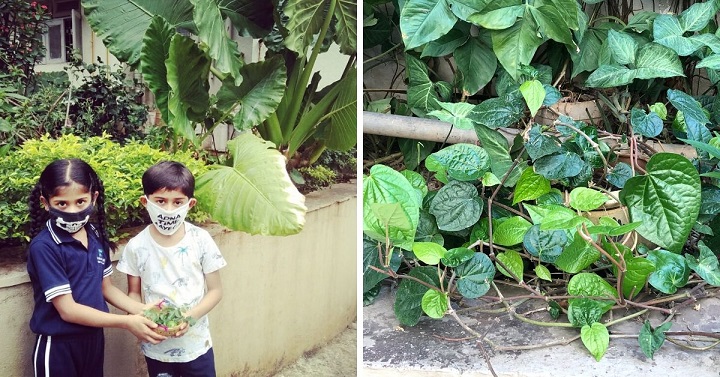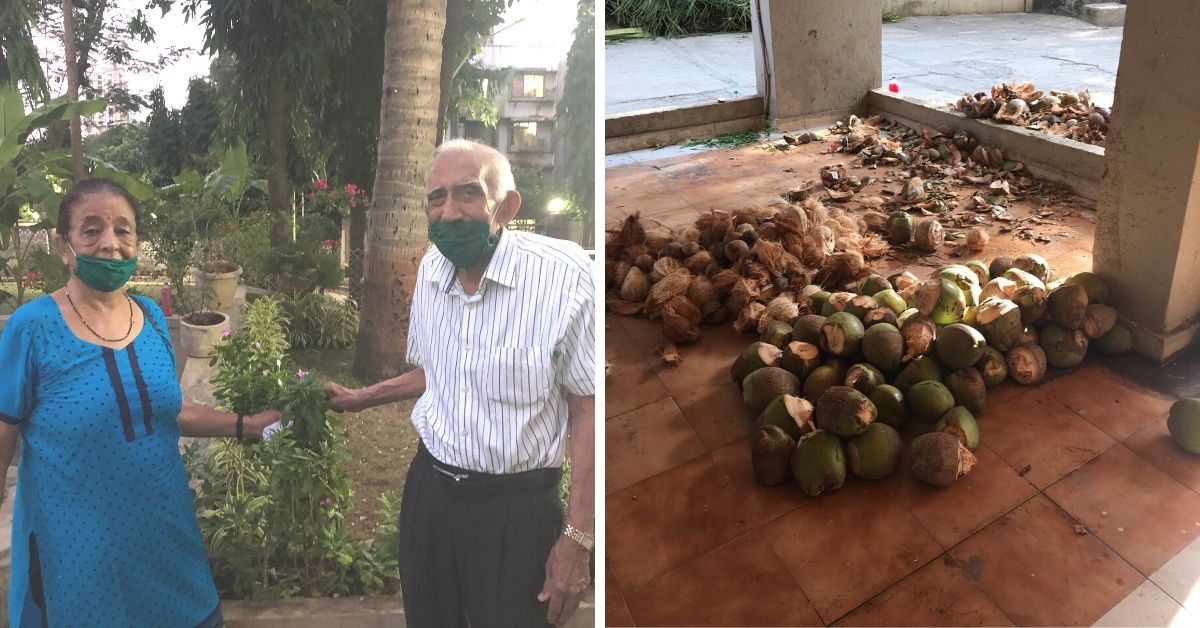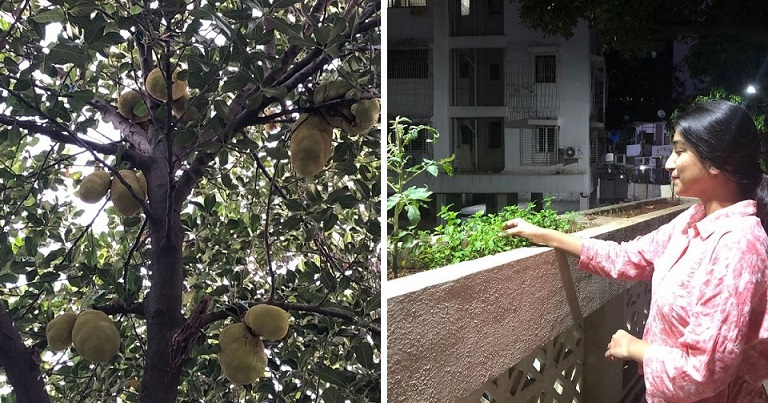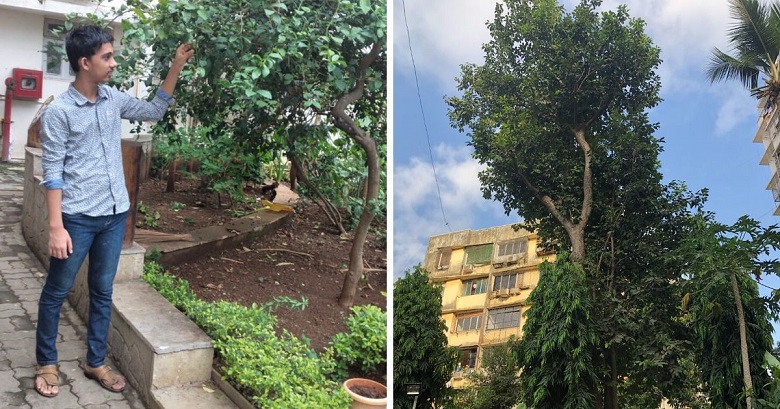Coconuts & Mangoes to Jamun & Jackfruit, Mumbai Society Grows it All For 86 Families
“I think we are making good use of our building area. It is a good way to make our children connect with nature in a cosmopolitan city. This is a rarity in big cities.”

Picture this: The cuckoo bird sings on the mango tree as the wind spreads the sweet smell of the freshly grown fruit, jackfruits call out to their takers, and coconut water is ready to beat the heat. Not just that, tulsi (Holy Basil), giloy (Tinospora Cordifolia), ardusi (Vasaka) and aloe vera do the serious talking for cures.
Looks like the typical setup of a farm, but guess what, this is a cosy residential society in the suburbs of Aamchi Mumbai.
This is the story of Kanchan Nalanda CHS Ltd, a housing society that has around 41 big trees, including jamun (java plum), mango, Ashoka, Gulmohar, drumstick (moringa), neem, coconut and jackfruit.
“We produce around 600 coconuts, 800-900 mangoes, 30-40 kg jamun and jackfruit each year,” shares Kamal Saboo. He’s a senior resident, active in the gardening and cleanliness initiatives of the society. He adds that these are equally distributed among the residents of 86 flats.
The society recently undertook coconut plucking, providing around 5-6 coconuts to each flat.

Health and well-being have taken centre stage due to COVID-19, and the residents of this Mumbai suburban society are reaping the benefits of their efforts.
However, there was a time when the society had a tiny area under cultivation and struggled to keep the trees and plants flourishing, with depleting soil health. Many believe that it was the magic of the in-house organic manure that led to the flourishing landscape.
“It all started in 2016 when we consciously decided to stop the air pollution caused by the burning of dry tree leaves collected in the society. And we commissioned a bio-compost pit in the premises, wherein dry leaves were converted into organic manure,” explains Rashmi Tak, chairperson of the society.
She adds that they were quick enough to adopt garbage segregation to the full support of the residents. “In 2017, we took up the segregation, and I am happy to share that our residents have been diligently following it.”
Suhas Vaidya, a senior member, played an instrumental role in promoting the compost pit and community gardening. Each flat is provided with two bins for wet and dry waste. Once collected, wet waste is converted into manure at the society’s bio-compost pit, which is managed by a professional agency.
Today, they have abundant organic manure and use it for community gardening within the premises.
“We took up community gardening to maintain cleanliness in the building and requested residents to bring down the plantation at their respective flats to the common garden area,” she adds.

The initiative also provided residents with an opportunity to engage with each other and share knowledge about various medicinal plants. They relish coconuts, mangoes, guavas, papayas, jackfruits, jamuns, bananas, lemons and lemons at their very own garden. The newest additions to the garden are pudina (mint), turmeric, pomegranate, native gooseberry and tomato.
Calcutta paan (betel leaf) is the showstopper that hides among the bushes and is a delicacy. While it is eaten for its taste and digestive benefits, a senior resident in the society pointed out its benefits in curing throat infections. “Just clean the leaf with water and chew it… your cough will vanish,” she smiles.
The society has also been popular for papaya leaves that are used as a cure for dengue fever. Ms Tak shares that the medicinal plant ardusi is very helpful in curing cough.
Interestingly, the plantation has been done by the residents with their limited knowledge, alongside a gardener. There has been no help from an agri expert on the kind of plants to grow.
“We are the modern farmers of Nalanda,” chuckles Darshan Mehrotra, a young resident of the society. He continues, “I think we are making good use of our building area with plants, trees, and flowers all around. It is a good way to make our children connect with nature in a cosmopolitan city. This is a rarity in big cities.”

During the lockdown, their daily needs for curry leaves, tulsi, flowers and lemons were met by the community garden.
They have also conducted workshops with the municipal corporation on garbage segregation and bio-composting which saw participation from other housing societies in the city. These efforts were recognised by the Municipal Corporation of Greater Mumbai (P South Ward) with a certificate under the Zero-Waste Campaign in 2017.
“We aim to make the environment pollution-free with eco-friendly practices. And we are happy to share our experience and learning with other societies,” says Archana Saboo, the secretary.
The society has set an example for others. What looked like an uphill task has become a success story, bearing fruits of Swachta and Aarogya!
(Written by Shweta Bhanot and Edited by Shruti Singhal)
Like this story? Or have something to share?
Write to us: [email protected]
Connect with us on Facebook and Twitter.
If you found our stories insightful, informative, or even just enjoyable, we invite you to consider making a voluntary payment to support the work we do at The Better India. Your contribution helps us continue producing quality content that educates, inspires, and drives positive change.
Choose one of the payment options below for your contribution-
By paying for the stories you value, you directly contribute to sustaining our efforts focused on making a difference in the world. Together, let’s ensure that impactful stories continue to be told and shared, enriching lives and communities alike.
Thank you for your support. Here are some frequently asked questions you might find helpful to know why you are contributing?


This story made me
-
97
-
121
-
89
-
167











